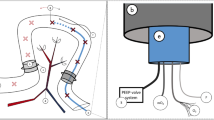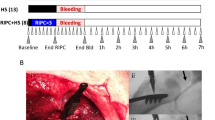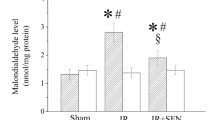Abstract
Although the pathogenesis of necrotizing enterocolitis remains uncertain, ischemia appears to be an important contributing factor to the development of this disorder. Reperfusion plays a major role in ischemia-related injury, and oxygen free radicals produced during reperfusion most likely contribute to the injury. These oxidants can be generated during prostanoid metabolism, which increases during reperfusion of ischemic gut in adult subjects. The present study was designed to: 1) examine the effects of superior mesenteric artery occlusion, e.g. ischemia and reperfusion in vivo on the development of histopathologic intestinal injury; 2) determine whether products of arachidonic acid metabolism, e.g. prostanoids are increased during reperfusion of ischemic gut; and 3) determine whether oxygen free radical scavengers attenuate the injury in newborn pigs. Chronically catheterized placebo-pretreated newborn pigs exposed to ischemia-reperfusion, placebo-pretreated nonischemic control pigs, and polyethylene glycol-superoxide dismutase (SOD) plus polyethylene glycol-catalase (CAT)-pretreated, ischemic pigs were studied by examining changes in intestinal circulation, oxygenation, prostanoids, and tissue injury. In the placebo-pretreated pigs, intestinal blood flow decreased to very low levels during superior mesenteric artery occlusion. During reperfusion, blood flow increased, but remained below baseline. After ischemia, oxygen uptake returned to values that were similar to baseline. Intestinal efflux of the vasodilator 6-keto-prostaglandin F1α was evident (p < 0.05 versus no or zero efflux) during early reperfusion. Histopathologic scoring of terminal ileal samples showed significant mucosal necrosis, surface epithelial disruption, lamina propria congestion and hemorrhage, submucosal hemorrhage, edema, and increases in cells compared with the placebo-pretreated nonischemic pigs. In the SOD plus CAT-pretreated ischemic pigs, changes in intestinal blood flow, oxygen uptake, 6-keto-prostaglandin F1α efflux, and the pattern of the ileal tissue injury did not differ significantly from the placebo-pretreated ischemic pigs. In summary, superior mesenteric artery occlusion for 1 h and reperfusion for 2 h resulted in severe intestinal ischemia, early postocclusive limited increases in intestinal perfusion and oxygen uptake, efflux of vasodilating prostanoids during early reperfusion, and signs of ischemic tissue injury in the placebo- and SOD plus CAT-pretreated pigs. This study demonstrates that, after superior mesenteric artery occlusion and reperfusion, severe intestinal tissue injury is detected in vivo, prostanoid efflux increases, and SOD plus CAT given just before occlusion does not attenuate the extent of injury in newborn pigs.
Similar content being viewed by others
Log in or create a free account to read this content
Gain free access to this article, as well as selected content from this journal and more on nature.com
or
Abbreviations
- ANOVA:
-
analysis of variance
- Cao2:
-
arterial oxygen content
- -˙V:
-
intestinal efflux
- +˙V:
-
intestinal influx
- ˙Vo2:
-
oxygen uptake
- CAT:
-
catalase
- SOD:
-
superoxide dismutase
- Cpvo2:
-
portal venous oxygen content
- PG:
-
prostaglandin
References
Uauy RD, Fanaroff AA, Korones SB, Phillips EA, Phillips JB, Wright LL 1991 Necrotizing enterocolitis in very low birth weight infants: biodemographic and clinical correlates. J Pediatr 119: 630–638.
Nowicki PT 1996 The effects of ischemia-reperfusion on endothelial cell function in postnatal intestine. Pediatr Res 39: 267–274.
Clark DA, Fornabaio DM, McNeill H, Mullane KM, Caravella SJ, Miller MJ 1988 Contribution of oxygen derived free radicals to experimental necrotizing enterocolitis. Am J Pathol 130: 537–542.
Granger DN, McCord JM, Parks DA 1986 Xanthine oxidase inhibitors attenuate ischemia-induced vascular permeability changes in the cat intestine. Gastroenterology 90: 80–90.
Das DK, Engelman RM 1993 Phospholipids in myocardial reperfusion injury. In: Das DK (ed) Pathophysiology of Reperfusion Injury. CRC Press, Boca Raton, FL, pp 150–169.
Filep JG, Braquet P, Mozes T 1991 Interactions between platelet-activating factor and prostanoids during mesenteric ischemia-reperfusion-induced shock in the anesthetized dog. Circ Shock 35: 1–8.
Crissinger KD, Grisham MB, Granger DN 1989 Developmental biology of oxidant-producing enzymes and antioxidants in the piglet intestine. Pediatr Res 25: 612–616.
Nowicki PT, Stonestreet BS, Hansen NB, Yao AC, Oh W 1983 Gastrointestinal blood flow and oxygen consumption in awake newborn piglets: effect of feeding. Am J Physiol 245:G697–G702.
Mayfield SR, Shaul PW, Oh W, Stonestreet BS 1989 Gastrointestinal blood flow and oxygen delivery during environmental cold stress: effect of anemia. J Dev Physiol 12: 219–223.
Rosenberg AA, Murdaugh E, White CW 1989 The role of oxygen free radicals in postasphyxia cerebral hypoperfusion in newborn lambs. Pediatr Res 26: 215–219.
Reilly PM, Schiller HJ, Bulkley GB 1991 Pharmacologic approach to tissue injury mediated by free radicals and other reactive oxygen metabolites. Am J Surg 161: 488–503.
Heymann MA, Payne BD, Hoffman JIE, Rudolph AM 1977 Blood flow measurements with radionuclide-labelled particles. Prog Cardiovasc Dis 20: 55–79.
Chemtob S, Beharry K, Barna T, Varma DR, Aranda JV 1991 Differences in effects in the newborn piglet of various nonsteroidal anti-inflammatory drugs on cerebral blood flow but not on cerebrovascular prostaglandins. Pediatr Res 30: 106–111.
Parks DA, Bulkey GB, Granger DN, Hamilton SR, McCord JM 1982 Ischemic injury in the cat small intestine: role of superoxide radicals. Gastroenterology 82: 9–15.
Schneider PA, Hamilton SA, Dudgeon DC 1987 Intestinal ischemic injury following mild hypothermic stress in the neonatal piglet. Pediatr Res 21: 422–425.
Chemtob S, Beharry K, Rex J, Varma DR, Aranda JV 1990 Changes in cerebrovascular prostaglandins and thromboxane as a function of systemic blood pressure. Circ Res 67: 674–682.
Barefield ES, Oh W, Stonestreet BS 1992 Group B Streptococcus-induced acidosis in newborn swine: Regional oxygen transport and lactate flux. J Appl Physiol 72: 272–277.
Nowicki P 1990 Intestinal ischemia and necrotizing enterocolitis. J Pediatr 117:S14–S19.
Nowicki PT, Hansen NB, Hayes JR, Menke JA, Miller RR 1986 Intestinal blood flow and O2 uptake during hypoxemia in the newborn piglet. Am J Physiol 251:G19–G24.
Szabo JS, Stonestreet BS, Oh W 1985 Effects of hypoxemia on gastrointestinal blood flow and gastric emptying in the newborn piglet. Pediatr Res 19: 466–471.
Mangino MJ, Anderson CB, Murphy MK, Brunt E, Turk J 1989 Mucosal arachidonate metabolism and intestinal ischemia-reperfusion injury. Am J Physiol 257:G299–G307.
Nowicki PT, Nankervis CA, Miller CE 1993 Effects of ischemia and reperfusion on intrinsic vascular regulation in the postnatal intestinal circulation. Pediatr Res 33: 400–404.
Granger DN, Richardson PDI, Kvietys PR, Mortillaro NA 1980 Intestinal blood flow. Gastroenterology 78: 837–863.
Bulkley GB, Kvietys PR, Parks DA, Perry MA, Granger DN 1985 Relationship of blood flow and oxygen consumption to ischemic injury in the canine small intestine. Gastroenterology 89: 852–857.
Parks DA, Grogaard B, Granger ND 1982 Comparison of partial and complete arterial occlusion models for studying intestinal ischemia. Surgery 92: 896–901.
Ment LR, Oh W, Ehrenkranz RA, Philip AGS, Vohr B, Allan W, Duncan CC, Scott DT, Taylor KJW, Katz KH, Schneider KC, Makuch RW 1994 Low-dose indomethacin and prevention of intraventricular hemorrhage: a multicenter randomized trial. Pediatrics 93: 543–550.
Heymann MA, Rudolph AM, Silverman NH 1976 Closure of the ductus arteriosus in premature infants by inhibition of prostaglandin synthesis. N Engl J Med 295: 530–535.
Chou CC, Alemayehu A, Mangino M 1989 Regulation of postprandial jejunal hyperemia and oxygen uptake. Am J Physiol 257:G798–G808.
Meyers RL, Alpan G, Lin E, Clyman RI 1991 Patent ductus arteriosus, indomethacin, and intestinal distension: effects on intestinal blood flow and oxygen consumption. Pediatr Res 29: 569–574.
Kuehl FA, Humes JL, Ham EA, Egan RW, Dougherty HW 1980 Inflamation: the role of peroxidase-derived products. Adv Prostaglandin Thromboxane Res 6: 77–86.
Kuehl FA, Humes JL, Egan RM, Ham EA, Beveridge GC, Van Arman CG 1977 Role of prostaglandin endoperoxide PGG2 in inflammatory process. Nature 265: 170–173.
Miller MJS, McNeill H, Mullane KM, Caravella SJ, Clark DA 1988 SOD prevents damage and attenuates eicosanoid release in a rabbit model of necrotizing enterocolitis. Am J Physiol 255:G556–G565.
Crissinger KD, Granger DN 1989 Intestinal blood flow and oxygen consumption: response to hemorrhage in the developing piglet. Pediatr Res 26: 102–105.
Parks DA, Granger DN 1986 Contributions of ischemia and reperfusion to mucosal lesion formation. Am J Physiol 250:G749–G753.
Bulkley GB 1983 The role of oxygen free radicals in human disease processes. Surgery 94: 407–411.
Bulkley GB 1987 Pathophysiology of free radical-mediated reperfusion injury. J Vasc Surg 5: 512–517.
Das DK, Engelman RM 1989 Mechanism of free radical generation during reperfusion of ischemic myocardium. In: Das DK, Esmann WB(eds) Oxygen Radicals: Systemic Events and Disease Processes. Karger, Basel, pp 97–126.
Parks DA, Bulkey GB, Granger DN 1983 Role of oxygen-derived free radicals in digestive tract diseases. Surgery 94: 415–422.
Brown MF, Ross A, Dasher J 1990 The role of leukocytes in mediating mucosal injury of intestinal ischemia-reperfusion. J Pediatr Surg 2: 214–217.
Vanhoutte P 1989 Endothelium and control of vascular function: state of the art lecture. Hypertension 13: 658–667.
Acknowledgements
The authors acknowledge the excellent technical assistance of Grazyna B. Sadowska and Lisa D. Boyle and the excellent secretarial assistance of Elizabeth R. Mottershead.
Author information
Authors and Affiliations
Rights and permissions
About this article
Cite this article
Papparella, A., Deluca, F., Oyer, C. et al. Ischemia-Reperfusion Injury in the Intestines of Newborn Pigs. Pediatr Res 42, 180–188 (1997). https://doi.org/10.1203/00006450-199708000-00009
Received:
Accepted:
Issue date:
DOI: https://doi.org/10.1203/00006450-199708000-00009



